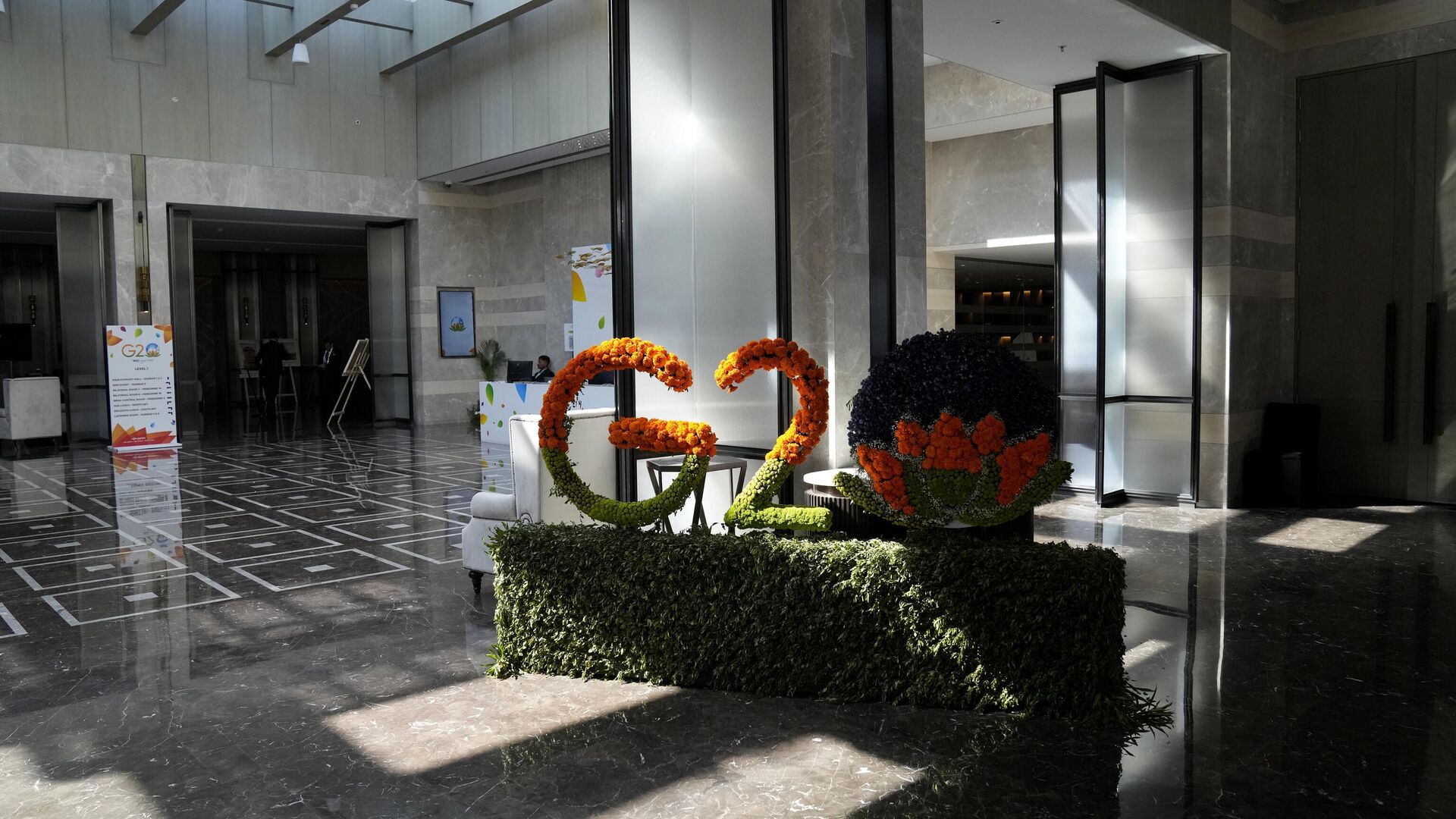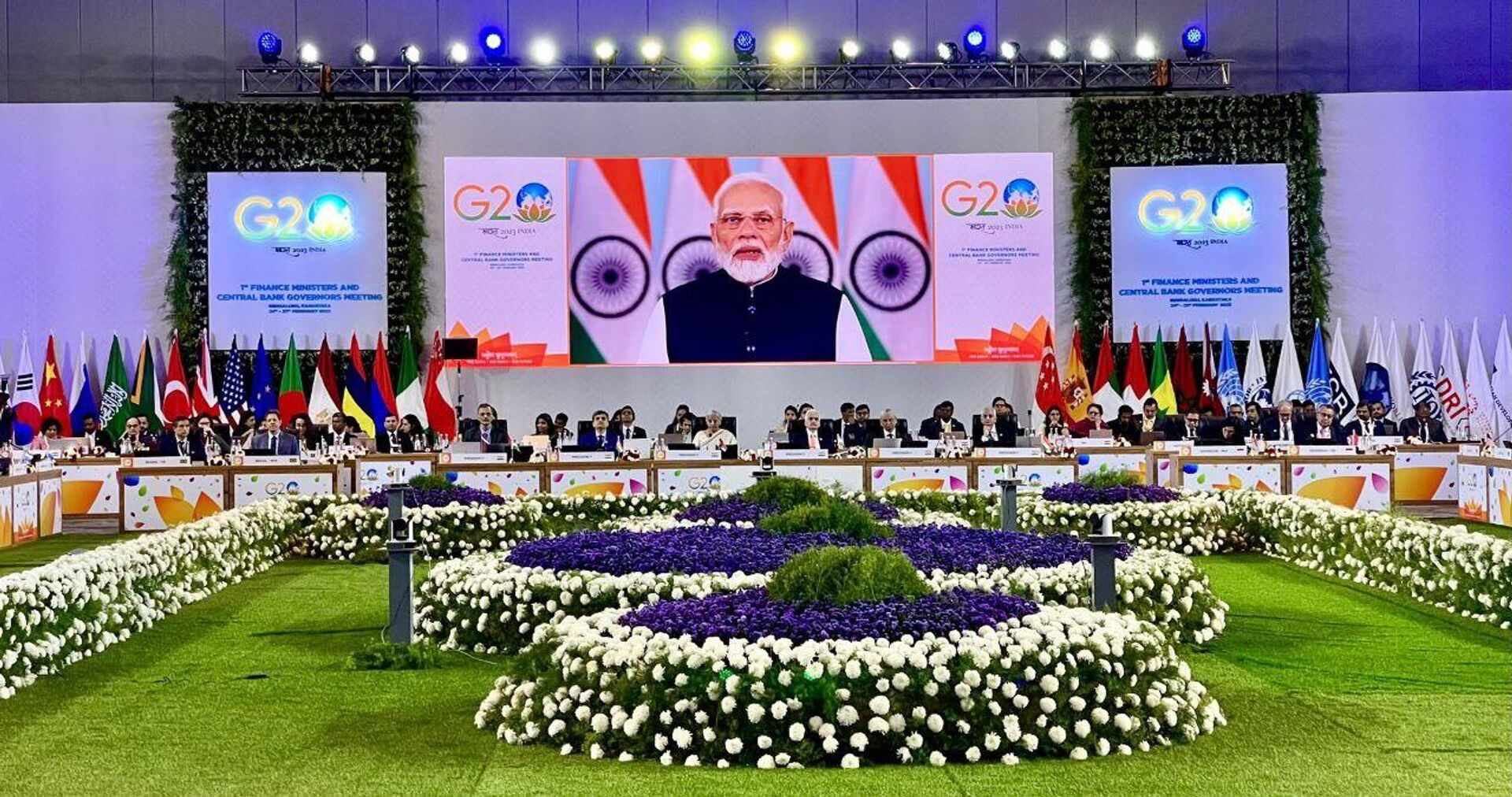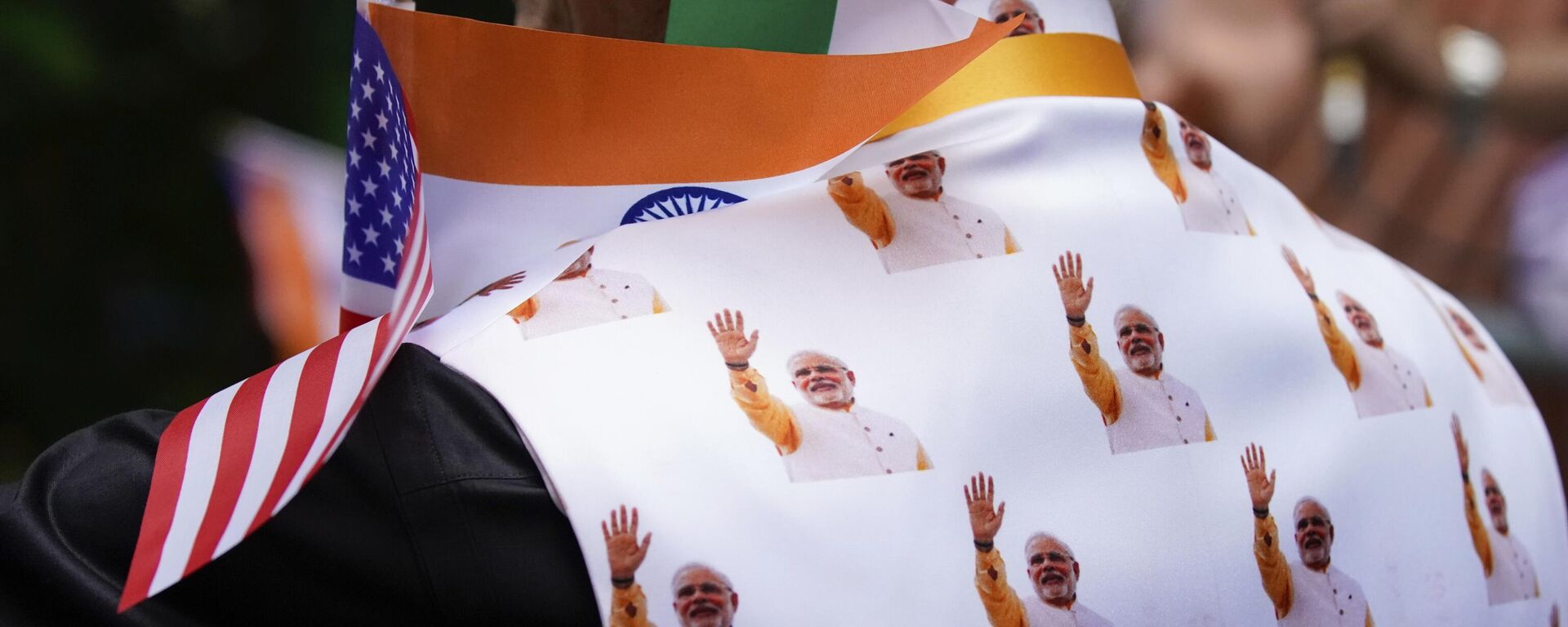https://sputniknews.in/20230826/bidens-agenda-for-g20-summit-differs-from-indias-analyst-says-3840321.html
Biden’s Agenda for G-20 Summit Differs from India’s, Analyst Says
Biden’s Agenda for G-20 Summit Differs from India’s, Analyst Says
Sputnik India
he agenda of US President Joe Biden and the western allies for the G-20 Summit “differs” from India, which could make it challenging to arrive at a consensus on the outcome document at the G-20 Summit.
2023-08-26T10:00+0530
2023-08-26T10:00+0530
2023-09-13T16:23+0530
joe biden
vladimir putin
s. jaishankar
india
russia
new delhi
un security council (unsc)
the united nations (un)
g-20
narendra modi
https://cdn1.img.sputniknews.in/img/07e7/04/0d/1534698_0:160:3072:1888_1920x0_80_0_0_bf9068b258caaf217f1ea1de30c4bab7.jpg
The agenda of US President Joe Biden and the Western allies for the G-20 Summit differs from India, which could make it challenging to arrive at a consensus on the outcome document at the G-20 Summit scheduled to take place in New Delhi on 9-10 September, an Indian expert has told Sputnik.Marjani recalled that none of the G-20 meetings held under the Indian presidency so far have come out with a mutually agreed upon outcome document due to the West’s insistence on including the "Bali geopolitical paragraphs". Both Russia and China have objected to these references.The G-20 comprises the world’s top 20 economies, including the G-7 club of rich democracies, as well as Russia and China.India’s External Affairs Minister S Jaishankar has defended New Delhi’s decision to not invite Ukrainian President Volodymyr Zelensky to the G-20 Summit, saying that the grouping isn’t meant to address issues of global security.New Delhi has consistently bucked pressure from the US and EU to draw down its economic ties with Moscow in the wake of the Ukraine conflict. On the contrary, India has ramped up its crude supplies and economic ties with Moscow to unprecedented levels, with Russia now ranking as India’s top crude supplier and one of its five biggest trading partners.India has also refused to vote against Russia at the United Nations.Unilateral Sanctions Worsening Global CrisisMarjani emphasized that the policy of unilateral sanctions has worsened the food and fuel crisis in the Global South, which has taken a toll on the world’s poorest countries.At multilateral groupings, New Delhi has consistently opposed the practise of imposing unilateral sanctions.Russian President Vladimir Putin this week blamed the unlawful sanctions for impeding Russian food and fertilizer supplies to the global markets, particularly developing states in Africa.What is Biden’s Agenda at G-20 Summit in New Delhi?A press statement by the White House this week said Biden would be travelling to the G20 Summit in India from 7-10 September.It said that the US president and the G-20 partners would discuss issues of “clean energy transition and combating climate change” as well as the Ukraine conflict.Notably, India and Brazil have been critical of developed countries for "cherry-picking developmental goals" by prioritising issues such as climate change over more urgent matters facing the Global South.The White House also said that Biden would discuss “increasing the capacity of multilateral development banks, including the World Bank, to better fight poverty, including by addressing global challenges”.The Indian leadership has maintained that UN reforms can’t be “denied forever”, and that the absence of such reforms would render the UNSC “obsolete”.Significantly, Prime Minister Modi has personally been lobbying global leaders for the African Union's (AU) inclusion as a permanent G-20 member, which is likely to fructify at the summit next month.At the BRICS Summit, Prime Minister Modi called for setting “defined timelines” for implementing UN Security Council reforms.
https://sputniknews.in/20230718/us-obsession-with-ukraine-is-rendering-g20-redundant-ex-envoy-warns-3062671.html
india
russia
new delhi
global south
ukraine
Sputnik India
feedback.hindi@sputniknews.com
+74956456601
MIA „Rossiya Segodnya“
2023
Dhairya Maheshwari
https://cdn1.img.sputniknews.in/img/07e6/0c/13/138962_0:0:641:640_100x100_80_0_0_2cb44360dbcdf6d84bf4b299cd045917.jpg
Dhairya Maheshwari
https://cdn1.img.sputniknews.in/img/07e6/0c/13/138962_0:0:641:640_100x100_80_0_0_2cb44360dbcdf6d84bf4b299cd045917.jpg
News
en_IN
Sputnik India
feedback.hindi@sputniknews.com
+74956456601
MIA „Rossiya Segodnya“
Sputnik India
feedback.hindi@sputniknews.com
+74956456601
MIA „Rossiya Segodnya“
Dhairya Maheshwari
https://cdn1.img.sputniknews.in/img/07e6/0c/13/138962_0:0:641:640_100x100_80_0_0_2cb44360dbcdf6d84bf4b299cd045917.jpg
g20 summit g20 summit in delhi, india g20 presidency, biden, ukraine russia news, ukraine russia war, russian fertilizer exports, russian wheat exports, voice of global south summit, global south, food crisis, fertilizer crisis, ukraine conflict, biden in india, biden visit to india, india russia relations, india russia ties, g20 news, modi news, bali geopolitical paragraphs
g20 summit g20 summit in delhi, india g20 presidency, biden, ukraine russia news, ukraine russia war, russian fertilizer exports, russian wheat exports, voice of global south summit, global south, food crisis, fertilizer crisis, ukraine conflict, biden in india, biden visit to india, india russia relations, india russia ties, g20 news, modi news, bali geopolitical paragraphs
Biden’s Agenda for G-20 Summit Differs from India’s, Analyst Says
10:00 26.08.2023 (Updated: 16:23 13.09.2023) India has said that addressing the concerns of the Global South, including food and fertilizer shortages, is one of the primary objectives during its G-20 presidency.
The agenda of
US President Joe Biden and the Western allies for the
G-20 Summit differs from India, which could make it challenging to arrive at a consensus on the outcome document at the
G-20 Summit scheduled to take place in New Delhi on 9-10 September, an Indian expert has told Sputnik.
“It is quite well-known that India’s position on the Ukraine issue has been different from the Western stance. India has continued to maintain strong ties with Russia and continuously insisted on the need to resolve the issue through dialogue and diplomacy”, stated Niranjan Marjani, a foreign affairs analyst and researcher.
He stressed that India’s stance during its G-20 presidency has been to voice support for causes of the developing world, be it multilateral governance reforms, addressing problems of debt distress, and the ongoing food shortages across the world.
Marjani recalled that none of the G-20 meetings held under the Indian presidency so far have come out with a mutually agreed upon outcome document due to the West’s insistence on including the "Bali geopolitical paragraphs". Both Russia and China have objected to these references.
“The G-20 came into being to forge economic coordination among the top global economies in the wake of the Global Financial Crisis (GFC). It is not a platform to discuss geopolitical differences at the expense of economic issues affected the Global South in particular”, Marjani highlighted.
The G-20 comprises the world’s top 20 economies, including the G-7 club of rich democracies, as well as Russia and China.
India’s External Affairs Minister S Jaishankar has defended New Delhi’s
decision to not invite Ukrainian President Volodymyr Zelensky to the G-20 Summit, saying that the grouping isn’t meant to address issues of global security.
“This is a summit to discuss energy issues, proposals, food proposals. This is the G-20, not the UN Security Council”, Jaishankar said.
New Delhi has consistently bucked pressure from the US and EU to draw down its economic ties with Moscow in the wake of the Ukraine conflict.
On the contrary, India has ramped up its crude supplies and economic ties with Moscow to unprecedented levels, with Russia now ranking as India’s top crude supplier and one of its five biggest trading partners.
India has also refused to vote against Russia at the United Nations.
Unilateral Sanctions Worsening Global Crisis
Marjani emphasized that the policy of unilateral sanctions has worsened the food and fuel crisis in the Global South, which has taken a toll on the world’s poorest countries.
“India’s endeavour during its G-20 presidency has been to work for the welfare of the developing nations. We have been trying to alleviate the food shortages caused due to spillovers of Ukraine conflict”, the Indian expert stressed, adding that nearly 125 developing countries attended the Voice of Global South Summit hosted by India in January.
At multilateral groupings, New Delhi has consistently opposed the
practise of imposing unilateral sanctions.
“BRICS members are also concerned with trade restrictive measures which are inconsistent with WTO rules, including unilateral illegal measures such as sanctions, that affect agricultural trade”, stated the Johannesburg II Declaration released after the 15th BRICS Summit, which was attended by Prime Minister Narendra Modi.
Russian President Vladimir Putin this week blamed the unlawful sanctions for impeding Russian food and fertilizer supplies to the global markets, particularly developing states in Africa.
“Russia is being deliberately obstructed in the supply of grain and fertilizers abroad and at the same time we are hypocritically blamed for the current crisis situation on the world market”, Putin told the BRICS Business Forum.
What is Biden’s Agenda at G-20 Summit in New Delhi?
A press statement by the White House this week said Biden would be travelling to the G20 Summit in India from 7-10 September.
It said that the US president and the G-20 partners would discuss issues of “
clean energy transition and combating climate change” as well as the Ukraine conflict.
Notably, India and Brazil have been critical of developed countries for "cherry-picking developmental goals" by prioritising issues such as climate change over more urgent matters facing the Global South.
The White House also said that Biden would discuss “increasing the capacity of multilateral development banks, including the World Bank, to better fight poverty, including by addressing global challenges”.
The White House statement remained silent on the ongoing push by India and other developing states on the need to reform multilateral groupings such as the UN, an issue which has found increasing resonance in the Global South.
Marjani said that New Delhi should make efforts on its part to impress upon the US and Western nations to urgently address the issue of multilateral reform.
The Indian leadership has maintained that UN reforms can’t be “denied forever”, and that the absence of such reforms would render the UNSC “obsolete”.
Significantly, Prime Minister Modi has personally been lobbying global leaders for the African Union's (AU) inclusion as a permanent G-20 member, which is likely to fructify at the summit next month.
At the BRICS Summit, Prime Minister Modi called for setting “defined timelines” for implementing UN Security Council reforms.




